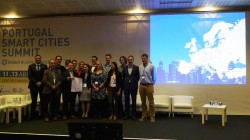Cities light the way with new manifesto
This manifesto is an agreement between cities to significantly change the smart city market place. The occasion of the signing was a day of workshops where the 76 cities across Europe that are direct beneficiaries of these projects discussed their progress in enhancing energy efficiency, and collaborating with the private sector to create models for doing business that will perpetuate and multiply the effects of the EU’s investment. In one such model, companies are actually fronting the money for green developments, asserting their social responsibility, and recouping investment from energy savings that accrue from more efficient systems. By fitting out old buildings with better insulation, solar panels and management systems that give residents more control over their energy use, cities can slash their CO2 outputs. The money saved then pays for the initial investment, plus an attractive return. Projects such as Sharing Cities, which pilot these and other business models create precedents which can be employed across Europe to benefit the economy, the cities and their citizens. Just as shops buy food at one price and sell it at another, there are different price potentials for smart city solutions. ‘Packaging’ means agreeing on a set of standards, for example when building smart lampposts, that are sufficiently generic for one product, or model, to be employed in many cities – while still allowing for personalisation. During one of the Lisbon workshops, cities worked to find the common ground upon which they could find easy-to-build solutions with a clear value proposition, at once component-based and interoperable at an affordable price. Packaging is a tool which cities can employ to cut costs so that residents can enjoy a better future with a lower price tag. Through European-funded projects, cities become laboratories where innovative ideas like this are tested, and when projects collaborate and share their results, effective solutions can be replicated, and common barriers identified and overcome. Many cities wrestle with the dilemma of how to protect their heritage buildings while improving energy ratings, preserving cities’ historic beauty while expelling pollutants. A study visit to the town hall inspired city leaders with Lisbon’s example: a 150 year old historic building that has been fitted with 100 solar panels, insulated glass, a charging station for electric vehicles and a computerised sustainable energy management system hooked up to its LED lights. Attendees at the workshops heard how the Royal Borough of Greenwich, which is the London demonstration area for the Sharing Cities project, had come up against heritage regulations that made it impossible to install solar panels in the World Heritage Site on the banks of the River Thames. The solution? Focus instead on renewable energy - a Water Source Heat Pump, using water from the River Thames basin - that will not change the outward appearance of the buildings and in fact take advantage of the resources of the Heritage Site. Innovative solutions like this are at the heart of smart cities, and by using EU funds to implement them, data from test cases provides proven results that convince other cities that change is possible. Read more: http://www.remourban.eu/news--events/press-releases/cities-light-the-way-with-new-manifesto.kl(opens in new window)
Countries
Portugal



